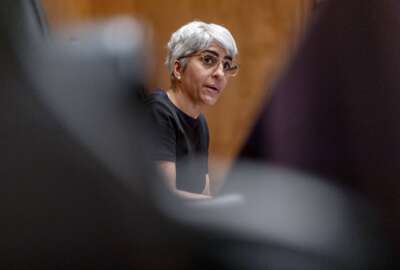In Japan, half of military spouse health workers unemployed amid ‘shortage’ of providers
In Japan, DoD appears to have both an insufficient number of health care employees and a large unemployed health care workforce ready to answer the call.
As Federal News Network has previously reported, feds stationed in Japan — particularly civilians — have had a very hard time accessing health care for well over a year, largely due to a lack of providers at military treatment facilities (MTFs). But there are signs that the shortage has more to do with a complex mix of policy decisions than an actual shortage in the labor force.
That’s one of the key takeaways from a new report by a volunteer advocacy group called Hire Oki Spouses, whose research was funded by the Air and Space Forces Association.
As to Okinawa in particular, where the authors focused, there appears to be a big surplus of trained health professionals available to DoD: military spouses with health care degrees who are already in Japan. But they also issued wide-ranging recommendations that highlight the problems military spouses face getting federal jobs worldwide.
The report estimates, based on local surveys of the local military community, that there’s a 49% percent unemployment rate in Okinawa among military spouses in the health care field. One of those surveys identified at least 50 individual unemployed health providers who were looking for work in 2023 on that island alone.
So how do you get to a place where there’s simultaneously a large, locally-available unemployed health care workforce and an insufficient number of health care workers at MTFs? That’s what the rest of the report tries to answer.
The full range of recommendations is more than we’ll be able to cover in this space, but one major component of the problem is DoD doesn’t appear to be advertising many vacancies for health care professionals, even when there’s a demand for their services.
Plenty of demand, not many openings
“There weren’t really job openings in the first place — there weren’t billets for us to even apply for,” said Kelly Pretorius, a report co-author who’s a Ph.D. health care researcher and licensed nurse practitioner. She and her spouse, a DoD civilian, recently returned from a tour in Japan. “A step to all of this is actually having the Defense Health Agency create the billets so that they can be filled. They do have a lot of contract positions, but we don’t know what the plan and longevity is for those specific positions.”
Contracted providers are certainly one option: Indeed, it’s the one DoD turned to during one of the most recent health care crises in Okinawa. Last June, all pregnant women in the care of the naval hospital there were told they’d have to be flown to the U.S. to deliver their babies and placed in a stateside “stork nesting” program. After media attention, DoD solved its provider shortage with an emergency plan to hire contractors and reversed course a few days later.
And the reliance on contractors to fill gaps, when they become critical enough to spill into the public eye, is understandable — considering the other challenges the report identifies in hiring military spouses to work directly for MTFs.
It’s no secret that the federal hiring process takes an absurdly long time. That’s no different for military spouses, but it’s compounded by the fact that military families are, in general, only in one place for three years at a time. A nurse who’s just moved to Okinawa or anywhere else might spend up to a year waiting just for HR processes and security clearances.
“By the time you get overseas, and you qualify for military spouse preference, and you apply to the position, you’re looking at 6 to 12 months. And then you’re leaving in another 12 to 24 months,” said Elayne Saejung, an Air Force spouse, public health researcher and another co-author of the report. “The onboarding time is part of the barrier. Stateside, those spouses could go get employed at an off-base hospital, but that’s not the case in Japan. The spouses can’t just go and apply to the local Japanese hospital, because they don’t speak the language, they don’t have the licensing requirements.”
And there aren’t many instances in which DoD has positions advertised in its MTFs, despite the shortages. As of the time of this writing, there are only three nursing jobs posted in all of Japan on USAJobs.gov.
Overly-centralized hiring
But even in cases where spouses manage to find a position they can apply for, the hiring process is harder than it needs to be, because HR decisions are made in the continental U.S. — many, many time zones away from the requirement.
“For instance, in one of our focus groups, somebody was going through the interview process, and they had stayed up until midnight for an interview, Japan time, in one of the stages of their interview process, and then ended up being stood up. That’s a good example of the challenges,” Pretorius said. “There is not a point of contact for you to ask questions. You can’t ask, ‘Do I meet the requirements for this job? Am I really what you’re really looking for?’ There’s not a way that you can have that conversation. So it was our recommendation that instead of having everybody stateside, to at least have a Japan representative.”
There are special authorities in place that are supposed to make this process easier — both as to the Defense Department’s need to hire health care workers, and as to the overall problem of keeping military spouses employed when their families move.
A June 2023 memo, for instance, renewed DoD’s position that department officials are allowed to use direct hiring authorities to onboard health care and medical professionals in situations where there are shortages. The department also has a program that’s supposed to give preferential hiring treatment to military spouses serving overseas.
Data gaps
But there are huge gaps in the government’s own understanding of how widely those authorities are being used.
As part of the Hire Oki Spouses project, one of the volunteer researchers submitted a Freedom of Information Act request to the Office of Personnel Management, asking how many positions were filled by military spouses. According to the FOIA data, there were only nine instances in which OPM was aware that any government agency had hired a military spouse into a health care job between 2021 and 2023. Only one was in Japan.
That reported figure is so low as to be implausible — but it’s very hard to tell how much of it is because of poor data collection practices, and how much is a reflection of a real problem. The actual answer, as usual, is probably a little bit of both.
At a minimum, the data Hire Oki Spouses managed to pull together from one community-led project in one location should serve as an indicator that the Defense Department could to do a lot more of the same, using its own substantial data gathering and analytical resources.
“The biggest data gap we found, honestly, is we’re not diving deeply enough into the local data,” Saejung said. “The unemployment data, under a broad umbrella, says that 21% of military spouses are unemployed. But the reality is when you start looking at hotspots — where the unemployment rate has remained stagnant for at least five years — shows we need to start looking at some of these locations that are actually struggling more than others. Okinawa is one of them, which is why I think the project is so important.”
Nearly Useless Factoid
Military children now outnumber actual U.S. troops by 1.4 to 1.
Source: Military.com
Copyright © 2025 Federal News Network. All rights reserved. This website is not intended for users located within the European Economic Area.
Jared Serbu is deputy editor of Federal News Network and reports on the Defense Department’s contracting, legislative, workforce and IT issues.
Follow @jserbuWFED






